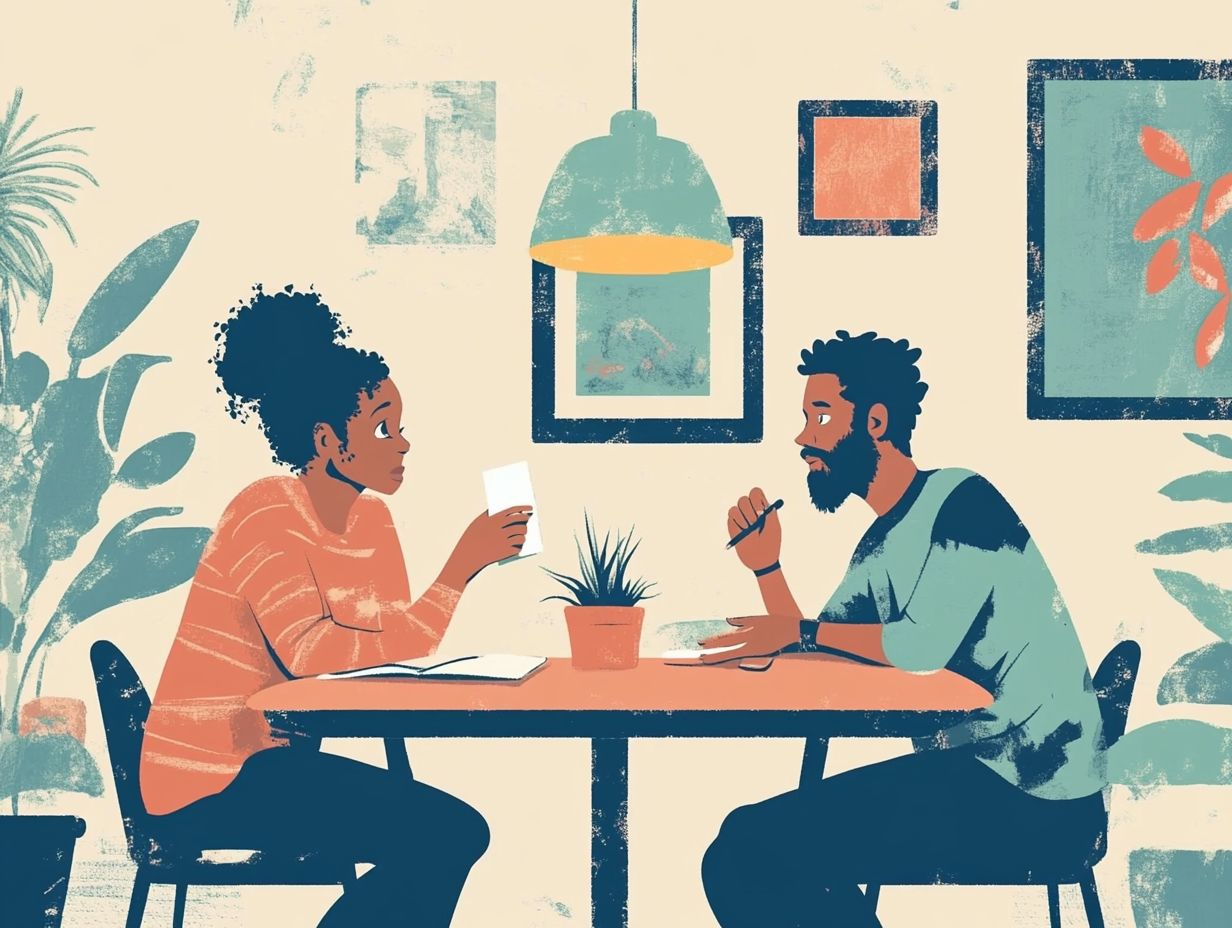How to Deal with Procrastination in Relationships
Procrastination isn’t merely a personal hurdle; it can significantly affect your relationships as well. Whether you’re putting off difficult conversations or delaying important plans, procrastination often arises from deeper issues that can erode trust and communication.
This article delves into the reasons behind procrastination in relationships and explores its impact on intimacy and connection. You’ll find practical strategies to overcome these challenges.
By understanding the roots of procrastination and adopting proactive habits, you can cultivate a healthier, more communicative partnership.
Dive in to uncover how to navigate this common stumbling block and strengthen your connections.
Contents
- Key Takeaways:
- Understanding Procrastination in Relationships
- The Effects of Procrastination on Relationships
- Overcoming Procrastination in Relationships
- Preventing Procrastination in Relationships
- Frequently Asked Questions
- How can I deal with procrastination in my relationship?
- What are some signs that procrastination is affecting my relationship?
- How can I motivate my partner to stop procrastinating?
- What if my partner’s procrastination is causing stress in our relationship?
- Is it possible to overcome procrastination in a relationship?
- How can I prevent procrastination from causing further issues in my relationship?
Key Takeaways:

- Procrastination can negatively affect communication and trust in relationships.
- Identifying and addressing underlying issues, as well as using effective communication strategies, can help overcome procrastination in relationships.
- Developing proactive habits and setting boundaries can prevent procrastination and maintain a healthy relationship.
Understanding Procrastination in Relationships
Let s dive into understanding how procrastination affects your relationships! Procrastinators often struggle with their emotional needs, which can significantly impact intimacy and communication with their partners.
This tendency can breed conflicts that affect the mental health of both individuals involved. Procrastination isn’t just about putting off tasks; it can reveal deeper issues tied to self-esteem and anxiety.
These issues can prevent couples from fostering emotional closeness and understanding. Thus, addressing procrastination is crucial for building healthy, trusting relationships.
What Causes Procrastination in Relationships?
Procrastination in relationships can arise from a variety of complex factors, often rooted in unmet emotional needs, issues of independence, and unhealthy patterns of connection.
These dynamics can lead you to postpone crucial discussions or decisions, effectively perpetuating a cycle of avoidance. For example, someone with an anxious attachment style may fear rejection, prompting them to delay addressing relationship concerns.
This only heightens their anxiety and adds tension between partners. If you prioritize independence, you might struggle to express your emotional needs, making your partner feel unappreciated or distant.
Over time, these patterns can lead to misunderstandings and resentment, highlighting the importance of recognizing how procrastination shows up in your relationship.
By doing so, you can work towards fostering healthier communication and a deeper connection.
The Effects of Procrastination on Relationships
Procrastination can significantly impact your relationships, resulting in diminished intimacy and heightened conflicts. When you delay important conversations or tasks, you may create a cycle of negative feelings.
This can lead to misunderstandings and gradually undermine your self-esteem and trust. Sidestepping confrontation often leaves issues unresolved, complicating communication and deepening emotional divides between you and your partner.
How Procrastination Affects Communication and Trust

Procrastination can create barriers that obstruct open dialogue and mutual understanding in your relationship.
When you consistently delay important topics, it can foster an atmosphere of anxiety where unresolved issues simmer beneath the surface. For instance, if you frequently postpone discussing your feelings about a recent conflict, your partner may interpret this as indifference or a lack of concern, leading to heightened frustration.
This ongoing pattern can ultimately undermine trust. Each unaddressed concern amplifies the feeling of being unheard or invalidated. Over time, the accumulation of communication breakdowns can harm the health of your relationship, nurturing resentment and forming a chasm that becomes increasingly difficult to bridge.
It s essential to address procrastination now before it harms your relationship further. Start addressing procrastination today for a stronger, happier relationship!
Overcoming Procrastination in Relationships
Overcoming procrastination in relationships demands a proactive mindset. A therapist can help you explore underlying issues and refine your communication strategies. Engaging in workshops designed to boost intimacy and resolve conflicts is immensely beneficial.
Collaborating to tackle procrastination helps you and your partner cultivate a stronger foundation of trust and understanding. This paves the way for healthier and more fulfilling relationships.
Identifying and Addressing Underlying Issues
Identifying and addressing the issues that contribute to procrastination in relationships is essential for your emotional well-being. This means examining your emotional needs and attachment styles, which are patterns of behavior in relationships.
For instance, if you have an anxious attachment style, you might struggle with low self-worth. This can cause you to delay expressing your feelings out of fear of rejection. Conversely, if you have an avoidant style, you may avoid discussions to maintain control, which can undermine your relationship.
Insights from therapists show that recognizing these dynamics opens the door to healthier interactions. By confronting these emotional barriers, you nurture deeper connections with your partner, leading to more fulfilling and resilient relationships.
Transforming Your Communication for Stronger Relationships
Implementing effective communication strategies is crucial as you and your partner work to combat procrastination.
Fostering an environment where both of you feel heard and understood helps address issues that lead to delays. Techniques like active listening allow you to express thoughts and feelings without interruption. This creates a safe space for open dialogue.
When you respond with empathy, you validate each other’s perspectives, ensuring emotional needs are met. For example, during a disagreement about household responsibilities, structured conversations guide you through problem-solving, avoiding escalation and promoting collaboration.
This approach not only addresses conflicts but also strengthens your bond by encouraging mutual respect and understanding.
Preventing Procrastination in Relationships

To prevent procrastination in your relationships, you must cultivate proactive habits and establish clear boundaries. This fosters a sense of teamwork and support, ensuring both partners thrive together. Additionally, exploring how to overcome procrastination with self-care can further enhance your efforts.
Proactive Habits and Practices
Proactive habits significantly reduce procrastination in relationships, fostering greater intimacy and collaboration.
When you and your partner engage in regular check-ins, you create a safe haven for open communication about feelings and expectations. This practice helps identify potential issues before they escalate and fortifies your emotional bond.
Setting shared goals nurtures unity as you work toward common aspirations, whether that’s planning a vacation or saving for a home. Keeping a joint to-do list streamlines daily tasks, allowing both to contribute and feel equally invested in your shared life.
These nurturing practices enhance teamwork and strengthen your overall connection, paving the way for a healthier, more harmonious relationship.
Setting and Maintaining Boundaries
Setting and maintaining boundaries is crucial for you as a couple. It helps prevent procrastination and ensures that both of your emotional needs are met.
Boundaries are personal limits that help define what you are comfortable with in a relationship. They create a framework where you and your partner can thrive.
This cultivates a safe environment to express feelings and needs. Understanding your limits and respecting each other s boundaries minimizes misunderstandings and fosters trust.
To effectively establish these boundaries, engage in open conversations about your expectations and desires. Check in regularly; this reinforces your commitment to the boundaries.
Practicing empathy allows for a level of flexibility that ensures each partner feels heard and valued. Ultimately, this enhances the health of your relationship and propels you both toward shared goals.
Frequently Asked Questions
How can I deal with procrastination in my relationship?

One way to deal with procrastination in relationships is to have open and honest communication with your partner. Discuss your concerns and refer to resources like how procrastination affects your relationships to come up with a plan together to address the issue.
What are some signs that procrastination is affecting my relationship?
If you and your partner frequently miss important deadlines, have trouble making decisions, or constantly push tasks and conversations to a later time, it may be a sign that procrastination is negatively impacting your relationship.
How can I motivate my partner to stop procrastinating?
Instead of nagging, understand the underlying reasons for their procrastination. Offer support and encouragement to help them stay on track.
What if my partner’s procrastination is causing stress in our relationship?
Address the issue calmly and without blame! Acknowledge the impact it has on you and your relationship, and work together to find solutions.
Is it possible to overcome procrastination in a relationship?
Yes! With open communication, understanding, and a willingness to work together, it is possible to overcome procrastination. It may take time and effort, but it can lead to a healthier and happier partnership.
How can I prevent procrastination from causing further issues in my relationship?
Be proactive and address any procrastination issues as soon as they arise. Set clear goals and deadlines, and hold each other accountable.
Practice good time management and communication skills to prevent procrastination from negatively impacting your relationship in the future.
Take the first step today! Start the conversation about boundaries and watch your relationship flourish!






